Dentures – Midland, TX
Practical Solutions for Missing Teeth

Do you find yourself struggling to chew the healthy foods you would normally eat? Do you often hide your mouth when you’re talking to someone? Do you avoid smiling because you are missing multiple teeth? These are the challenges you may be facing on a daily basis, and it can become frustrating and hold you back from enjoying life. You should consider dentures in Midland for replacing your teeth and drastically improve your function and appearance.
If you would like to learn more about dentures and determine if they are the right option for you, contact Boyles General Dentistry & Implant Center to learn more about how we can help.
Why Choose Boyles General Dentistry & Implant Center for Dentures?
- Start-to-Finish Implant Dentures Under 1 Roof
- In-House Dental Plan for Those Without Insurance
- Cutting-Edge Technology for Comfortable Dentures
Who’s a Good Candidate for Dentures?

When it comes to tooth replacement, dentures are the most universally known and most chosen option, not just because of their benefits but also because they can work for the strong majority of patients with tooth loss. During your consultation, Dr. Boyles will examine you to see if you make a good candidate for dentures and discuss what options are available to complete your smile, so reach out to our team and schedule an appointment.
Effects of Missing Teeth

If you’ve lost multiple teeth, you probably have experienced some of these common effects: difficulty speaking or communicating clearly, embarrassment or a blow to your confidence, or trouble eating certain foods.
Even if you can’t easily see a lost tooth, the gap can greatly impact your smile’s health and appearance. Remaining teeth are prone to shift toward the space, creating wider gaps and changing how your upper and lower teeth match up. As a result, your ability to bite or chew could be compromised, and your teeth can completely alter your aesthetic.
What Qualifies You for Dentures?

Unless you choose to attach your dentures to implants, the requirements for these prosthetic teeth are pretty basic and easy. You just need to have a generally healthy mouth. If you have a cavity or infection, we’ll have to address the issue before we work on your dentures, but otherwise, basically anyone with multiple tooth loss can get these prosthetic teeth!
Alternative Tooth-Replacement Options

When we examine you for dentures, we can discuss all your restoration options and identify the one that will best serve you and your smile. Although dental implants require more—a healthy mouth and a strong jawbone—attaching your dentures to them not only makes your prosthetic teeth last significantly longer but also gives them additional strength and stability. In fact, these replacement teeth can restore up to 70 percent of your original biting force and definitely won’t slip while you eat or talk. In other words, if you haven’t seriously considered implant dentures before, you certainly should!
Types of Dentures
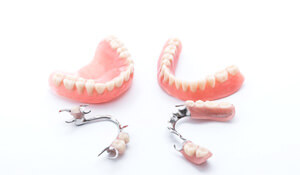
You might be thinking of the unsightly or ill-fitting denture that your grandparents wore; however, today’s dentures are much different. The shape, shade, and fit of your denture are all highly customized to your unique and specific needs so you denture not only provides a secure fit but is also aesthetically pleasing.
Partial Dentures
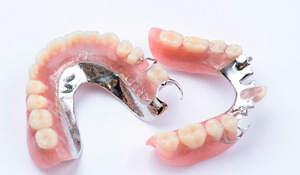
For patients who still retain a large number of healthy teeth, a partial denture allows them to maintain their teeth while filling in the open spaces with prosthetic ones, similar to a puzzle piece. A partial is also removable and uses clasps to anchor to healthy teeth. It is a good option for restoring both function and aesthetics to your smile.
Full Dentures
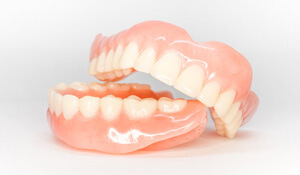
Full dentures are traditionally removable and rely on suction to your jawbone and a tight fit to stay in place, and some patients experience movement as they get used to eating and talking with their new appliance. For this reason, your denture may need to be relined periodically to ensure a snug fit.
Implant Dentures
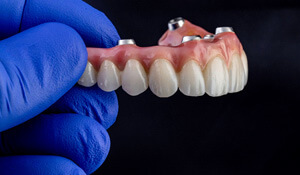
An implant-retained denture is for those patients replacing all of their teeth that are looking for a stable and secure fit. This option also works well for patients who are currently living with a denture that doesn’t fit properly.
With implant dentures, a few dental implants are placed into your jawbone and your denture is designed to fit into them. This type of denture provides a secure fit that doesn’t allow for any movement or slippage. Implants also offer the added bonus of protecting your jawbone from the deterioration that occurs over time due to the pressure that traditional removable dentures place on it.
The Benefits of Dentures

As you likely already know from personal experience, tooth loss comes with many drawbacks, including lower self-esteem, difficulty eating, and struggles speaking, but custom dentures take care of these problems, especially implant dentures. In many, many ways, these replacement teeth can improve your quality of life, health, and confidence. Simply put, the benefits of dentures are impossible to ignore for those who have lost multiple or all of their teeth.
Psychological Benefits

Your teeth can have a surprisingly powerful impact on your mental health. For instance, instead of feeling self-conscious about the gaps in your smile, you can feel more confident in your appearance with dentures. With that confidence, you can show your smile more often, and did you know that smiling isn’t just an indication of happiness but also a cause? In other words, when you smile frequently, you feel better emotionally and mentally!
Clearer Enunciation

Although tongue twisters can be tricky even for those with a full set of teeth, pronouncing simple sounds can be particularly challenging for those with gaps in their smile. It can be isolating and frustrating to say the least! Dentures give your mouth necessary teeth for various sounds in language, enabling you to speak and communicate more clearly and helping you connect with those around you.
Improves Nutrition

Pretty soon after you adopt a soft foods diet, you’ll learn that your options are limited. In fact, many people with missing teeth turn to more processed foods because they are easier to bite and chew, but this leaves them without necessary nutrients and with unnecessary fat, sodium, and calories. On the other hand, dentures empower you to eat a more diverse, nutritious diet with fruits and vegetables, which can lead to more energy and better health overall.
Preserves Oral Health

Especially with implant dentures, your restorations can help keep your mouth healthier. Without teeth, your jaw collapses, giving you a sunken, older look as well as impairing your function. Traditional dentures give you a fuller look and keep any remaining teeth in their proper alignment. Implant dentures go a step further by strengthening the jawbone itself. As a result, you retain a more powerful bite and a more youthful facial shape when you work with us and replace your missing teeth.
Expands Opportunities

When you have an incomplete smile, it can be a little off-putting for others. In fact, it may close doors in career or social situations. In contrast, when you have a healthy-looking, beautiful smile, others can be more willing to give you a chance. In other words, dentures could help you meet someone new, get the job you want, or open all kinds of opportunities to you!
Understanding the Cost of Dentures

At Boyles General Dentistry, we know your restored smile needs to be durable as well as beautiful. That’s why we encourage avoiding cheaper quality acrylic in favor of dentures that will last longer and feel more comfortable. Regardless of your needs, we’ll provide a solution that not only enables you to enjoy all the benefits of having a full smile again but also fits within your budget. With us, you’ll never have to compromise on quality!
Factors that Affect the Cost of Dentures
Not two dentures are exactly the same because each patient is unique. To calculate the price of your dentures, we consider many factors, including the number of teeth that need to be replaced. For instance, a full denture will cost more than a partial denture. In addition, if you require other treatment, such as tooth extraction or gum disease therapy, before receiving your dentures, keep in mind that these procedures incur their own separate cost.
Are Implant Dentures More Expensive?
Implant dentures differ from traditional dentures in that they attach to the jawbone directly rather than rely on suction for stability. This process requires a complex placement procedure, which we can perform in-house, adding to the cost of treatment. As a result, implant dentures are typically more costly than normal dentures. However, when you take into account all the benefits implant dentures have to offer, the extra investment becomes well worth it.
Does Dental Insurance Cover Dentures?
It’s difficult to pinpoint a specific percentage of what insurance will pay for dentures because plans can vary. However, the vast majority of dental insurance benefits do cover at least part of the cost of dentures. Before we get started creating your custom dentures, we will look at your plan closely and let you know how much you’ll owe out-of-pocket. Our team has years of expertise in working with insurance, and we’ll try to find ways to help you save as much as possible.
Other Options for Making Dentures Affordable
If you don’t have dental insurance, we provide an alternative that could still help you avoid paying the full amount on your own. Our in-house dental plan enables you to get discounts on basically all restorative work for a reasonable annual fee. With or without insurance, if you still cannot afford to pay the out-of-pocket cost all at once, a third-party financier may be able to offer easier monthly payments. CareCredit, Alphaeon Credit, and GreenSky are all trusted companies we work with, and we can guide you through the application process.
Dentures Aftercare
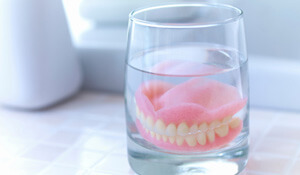
Whether you have any natural dentition left or not, your prosthetic teeth require maintenance. Although your dentures cannot get cavities, inflammation-causing bacteria and plaque can still accumulate on the surface, irritating and infecting your gums. Caring for your dentures entails simple tasks that you can easily implement into your lifestyle, and it will help you enjoy your replacement teeth for as long as possible!
Removable Dentures
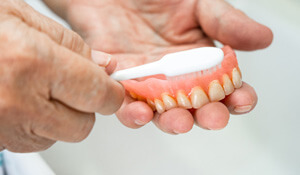
If you have dental prosthetics you can take out of your mouth, there are several steps you need to take to keep them and your mouth in excellent shape. These steps aren’t difficult, but they will require a little bit of extra time and effort, but having a brilliant, confident smile is well worthwhile!
Remove After Eating
Even though suction keeps your dentures in place, it doesn’t mean little bits of food can’t find their way underneath your dentures. This situation can be not only uncomfortable but also conducive to oral infection. As a result, after eating, especially after meals, you need to take your dentures out of your mouth to rinse them off. Your mouth will feel much better!
Clean Your Restoration
At least once a day, you need to clean your prosthetic teeth. Most of the time, you can simply use a soft-bristled toothbrush and a non-abrasive toothpaste to scrub your dentures. This will keep bacteria-filled plaque to a minimum. Every few days, you can also consider using denture cleanser for more protection.
Keep Your Dentures Safe
In the process of taking your dentures out and cleaning them, it’s all too easy to accidentally drop them, which can damage the materials. Before you begin your maintenance and remove them from your mouth, be sure to have a towel out on and in the sink to catch them gently if they fall out of your hands.
Remove Dentures When You Sleep
To retain their shape, your dentures need to stay moisturized. When you sleep, however, your mouth produces less saliva; plus, many people sleep with their mouth slightly open, drying out the mouth further and welcoming more bacterial growth. As a result, you should take your dentures out and put them in a glass of water next to your bed to soak overnight.
Notice Changes
Regardless of how well you take care of your traditional dentures, the way they fit will slightly change over time. Pay attention and track moments when your dentures slip or feel loose and tell Dr. Boyles. It could be time for an adjustment or replacement to keep your dentures fitting securely.
All-on-X Dentures

Care for dentures that are secured with four to eight implants differs from that of traditional dentures. However, it looks exactly like maintaining natural teeth! Because your prosthetic teeth are firmly anchored to root-like posts, you can’t take them out, but you can brush and floss them just like real teeth. In fact, you need to do these simple tasks every day to prevent plaque buildup. You also need to continue coming for regular checkups with Dr. Boyles to make sure your implants and dentures—as well as your gums and jawbone—are in healthy condition.
Frequently Asked Questions – Dentures

As you consider your options for replacing your missing teeth, you probably have questions about dentures. We want to guide you to the right treatment choice for you, so we’ve provided answers to some common inquiries. If you have other questions about dentures, don’t hesitate to contact our team. We’ll be happy to discuss your replacements and which option can best meet your needs.
Will I be able to speak and eat normally with my dentures?
When you have dentures, you have to get used to a slightly different way of speaking and eating. For example, your biting and chewing power with dentures is less than your natural teeth, so you may need to adapt your eating habits. Although the natural suction of the denture keeps it in place, it can still slip out of position if you’re not careful. It can take time to adjust to your new dentures, so be patient with yourself. Also, after a few years, the dentures may require alterations to continue to fit properly.
Are dentures the best option for replacing missing teeth?
Although dentures tend to be a popular choice because of the cost effectiveness, they are not usually the first replacement option recommended. Rather, we usually prefer to replace teeth with dental implants because the implant posts integrate with the jaw bone, making the artificial teeth essentially just as strong and functional as natural ones. Using just four to six implants, we can hold a full denture in place, giving your replacement teeth much more stability. Plus, with implants, your dentures can last for multiple decades without needing to be adjusted or replaced. To learn more about dental implants, contact us for an appointment.
Can dentures be repaired?
Dentures can be repaired to an extent. Every few years, your traditional dentures may need to be slightly altered to continue fitting properly as your jaw bone loses density and shape. Usually around the seven-year mark, sooner if it takes significant damage, you will likely need to replace your dentures entirely.
What is the process of getting dentures?
Getting dentures is simple. Basically, we will collect an impression of your mouth and send it to a dental lab. There, a technician will craft your unique, personalized dentures. Once they are finished, you’ll come back to our dental office, and we’ll ensure the perfect fit by making any necessary minor tweaks. As mentioned before, it could take a little bit of time for you to get used to the feel of dentures at first, but they should feel comfortable.
Why Is Replacing Lost Teeth Important?
Perhaps you are missing teeth in the back of your mouth, where the gap isn’t as visible when you smile. Or maybe you think you’ve gotten used to not having a full set of teeth. You can try to rationalize having an incomplete smile, but the truth is that you’re settling for less function and confidence. Especially with implant dentures, you can regain the ability to eat basically any foods you’d like, and you can freely show your teeth through smiling without embarrassment.
Am I a Good Candidate for Dentures?
Most patients who need dentures qualify for them. Aside from missing two or more teeth, you need to have a healthy mouth to be eligible for dentures. This means any remaining teeth must be cavity free, and your soft tissues must be in good shape as well. However, even if you have gum disease, tooth decay, or another obstacle, we can treat your mouth to help you be in a better position to replace your lost teeth.
What Should I Do If My Dentures Break?
Dentures are made of tough materials, but they are not indestructible. In addition to being careful about what and how you eat, please be cautious and try to avoid dropping your dentures. If, however, your dentures do become broken, stop wearing them and call us for an immediate appointment. Wearing broken dentures can harm your soft tissues. Do not use superglue or another adhesive to try to repair your false teeth. In our office, we can make minor adjustments and repairs, but if the damage is extensive, we may need to order replacement dentures.
How Long Does It Take to Get Dentures?
Overall, the process of getting dentures usually requires several weeks and at least one fitting. This timeline may be longer if additional adjustments are necessary for the fit. If you are receiving implant dentures, the placement surgery and subsequent recovery will also add to your treatment plan. However, we assure you that the final results are well worthwhile!
Are Dentures Just for the Elderly?
No! Modern dentures are more advanced than ever and are used to help any adult patient who is missing two or more teeth. Because of the way they are designed to fit within your mouth, you can expect your dentures to look just like real teeth. Implant dentures are particularly lifelike. Whether you’re 25 or 105, if you need dentures to complete your smile, we’re here to get your confidence back.
